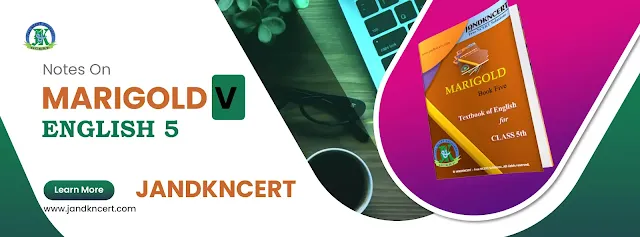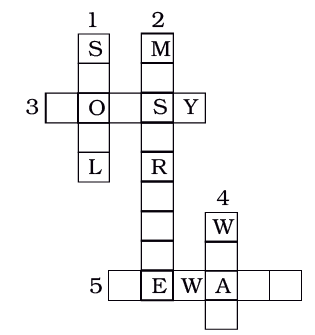JANDKNCERT - Free NCERT Solutions
English
| Marigold Book V
If you are seeking NCERT solutions,
you've come to the right place. JANDKNCERT
offers free solutions for a variety of NCERT books, including the recently
introduced 'Marigold' English version for Class 5 students in JK UT. Explore
our library at www.jandkncert.com
for valuable study materials and simplified solutions to the lessons/chapters
in this book. To view the Tulip Series of class 5th English visit https://www.jandkncert.com/p/free-ncert-solutions-for-class-5th.html
In this post, you will find the summary, questions
and answers to the lesson ‘The Little Bully’, taken from the recently
introduced English for JK UT students, Marigold Book V. Read the lesson from
the Textbook of English Marigold Book V of JK or download the same series from the ncert website.
Unit
8
Summary |
Questions | Answers |
Lesson 8. The Little
Bully (Enid Blyton)
Short Summary
"The Little Bully" by Enid Blyton is a short story that follows a small boy named Hari who is known for his bullying behaviour. Hari delights in pinching, teasing and tormenting other children, making them feel small and miserable. However, one day, Hari's behaviour catches up with him when he encounters mysterious little crabs and prawns who teach him a lesson about the consequences of his actions. Through a series of magical transformations, Hari experiences firsthand the pain and fear he has inflicted on others. By the end of the story, Hari learns the importance of kindness and empathy, realizing that bullying others only leads to loneliness and regret. "The Little Bully" serves as a cautionary tale about the harmful effects of bullying and the value of treating others with respect and compassion.
New Words
bruise:
injury by blow to body
horrid:
Terrible
hoarse:
rough and deep sounding
pincer:
gripping tool
stalk:
main stem
nipped:
pinched
Reading is Fun
Now that you have read
and understood the lesson, can you answer these questions? You can put a ( ) on
the right answer.
1.
Why did all the children hate Hari?
(i)
Because he would not talk to anyone.
(ii)
Because he always pinched them.
(iii) Because he loved
stealing their food.
Answer:
(ii) Because he always pinched them.
2.
“Nobody took Hari’s hand. Nobody went near him. Nobody played with him.” This
shows that Hari had
(i)
many friends.
(ii)
few friends.
(iii) no friends.
Answer:
(iii) no friends.
3.
Which of the following actions would make a friendly person? Write them down.
Respecting
other people.
Eating
a small child’s tiffin.
Calling
people rude names.
Pushing
a smaller boy and making him cry.
Being
helpful to everyone.
Helping
your classmates in school.
Mocking
at friends and hurting their feelings.
Protecting
a weaker person.
Answer:
Actions
that would make a friendly person
· Respecting
other people.
· Being
helpful to everyone.
· Helping
your classmates in school.
· Protecting
a weaker person.
Vocabulary
1. Find out words that
are opposites or are closest to being the opposites of the words given below.
Then write down the opposites in the grid.
Down
1.
smile
2.
happy
4.
strong
Across
3.
quiet
5. punish
Answer:
Down
1.
Smile – Scowl
2.
Happy – Miserable
4.
Strong – Weak
Across
3.
Quiet - Noisy
5.
Punish - Reward
2. Hari was pinched till
he was black and blue. ‘Black and blue’ means
(i)
Hari fell down in pain.
(ii)
There were bruises on his body.
(iii)
Hari painted himself in colours.
(iv)
Hari had a black and blue shirt.
Answer:
(ii) There were bruises on his body.
3. ‘I shan’t pinch
anyone anymore’. Shan’t means.
(i)
shall
(ii)
should
(iii)
shall not
(iv)
will not
Answer:
(iii)
shall not
4.
Give the full forms of
won’t
__________
weren’t
__________
wouldn’t
__________
couldn’t __________
Answer:
won’t
– will not
weren’t
– were not
wouldn’t
– would not
couldn’t
– could not
5. A girl was sitting
quietly beside him. Hari leapt to his feet, crying loudly.
The words quietly and loudly
tell us how an action is being done.
Find five more words
ending in -ly which denote how something is
done.
(i)
______________________ ly
(ii)
______________________ ly
(iii)
______________________ ly
(iv)
______________________ ly
(v)
______________________ ly
Answer:
(i)
Nicely
(ii)
Seriously
(iii)
Mostly
(iv)
Properly
(v) Lovely
Add -ly to the
following words.
|
Clear merry
weary double Dreary
bright bad fond |
Answer:
Clear
– Clearly
Merry
– Merrily
Weary
– Wearily
Double
– Doubly
Dreary
– Drearily
Bright
– Brightly
Bad
– Badly
Fond
– Fondly
Now can you make
sentences with these words?
1.
Clearly – I can see clearly through the window.
2.
Merrily – The children danced merrily in a marriage party.
3.
Wearily – He wearily lifted the bucket of water.
4.
Doubly – We were doubly certain of his guilt after we read the article
in the newspaper.
5.
Drearily – He left the house drearily to join his duty.
6.
Brightly – The sun is shining brightly.
7.
Badly – He wanted the job badly.
8.
Fondly – I am fondly remembering the time spent with her.
Fun With Sounds
1.
Let’s practice with P and F.
|
pleased fat palm farm |
pricked fruit pair
fare |
pinched fell proud frown |
punished forgotten parade fish |
2. Complete the blanks
with rhyming words of the following and practice aloud.
Bruise c___________
Carriage m _________
Prawn d __________
Creatures fe___________
Teachers pr___________
Vowed c___________
Answer:
Bruise
– Cruise
Carriage
– Marriage
Prawn
– Dawn
Creatures
– Features
Teachers
– Preachers
Vowed
– Cowed
Let’s Practice Some Writing
1. How did the seaside
creatures, the crab, the lobster etc. teach Hari a lesson? Write in a few
lines.
Answer:
The seaside creatures held their claws to Hari. They
pinched and nipped him. Hari tried to free himself but in vain, instead they
caught hold him with their claws so hard that Hari yelled in pain. Shrimps,
prawns, crabs and lobsters pricked Hari till he was soon black and blue with
their pinching. They ate his lunch too.
2. Read these sentences
carefully.
I
ate an apple.
A
boy is standing under the tree.
The
sun rises in the east.
A
and an do not point out any definite or
particular person or thing whereas, the is
used when we speak of some particular person or thing. A,
an and the
are called articles.
Remember an is used before words beginning with a vowel a, e,
i, o, u.
Now fill in the blanks
with appropriate articles.
(i)
Hari was __________ unpopular boy.
(ii)
The boys and girls went to __________ seaside for a picnic.
(iii)
He saw __________ big crab coming towards him.
(iv)
I found __________ empty bottle, floating in the water.
(v)
______________sea creatures ate his food.
Answer:
(i)
Hari was an unpopular boy.
(ii)
The boys and girls went to the seaside for a picnic.
(iii)
He saw a big crab coming towards him.
(iv)
I found an empty bottle, floating in the water.
(v)
The sea creatures ate his food.







Leave your comment here. Spam comments will be removed.